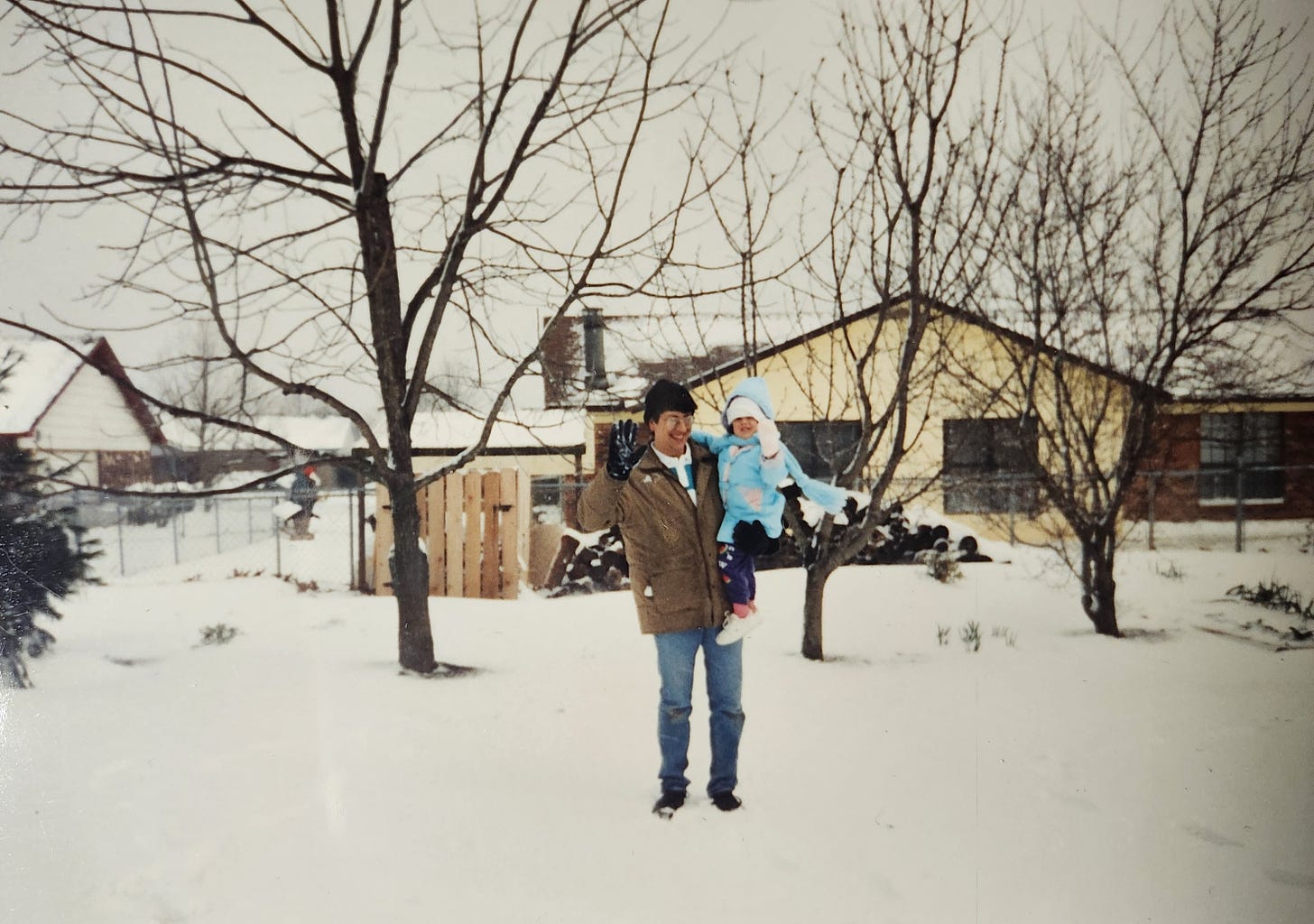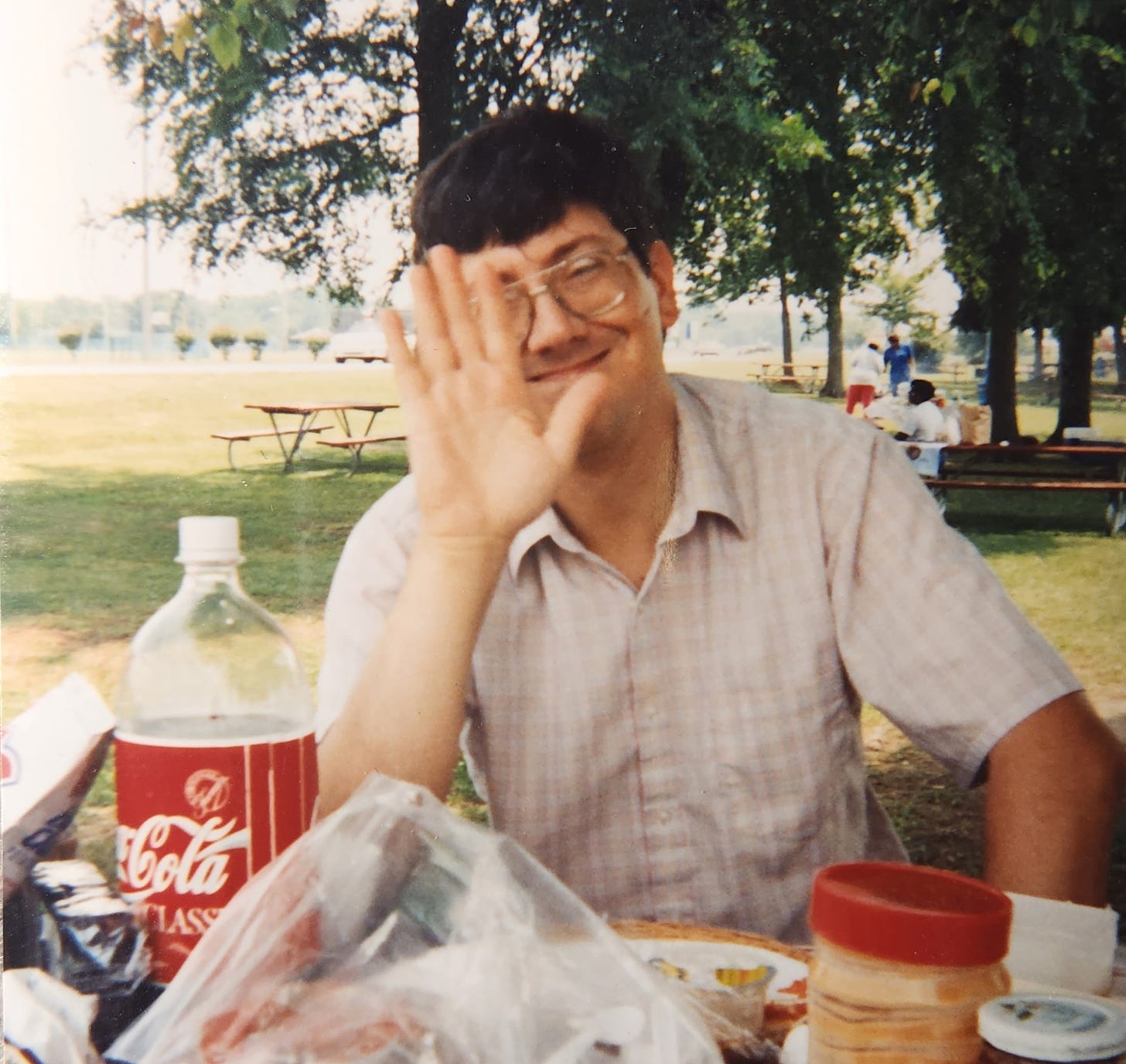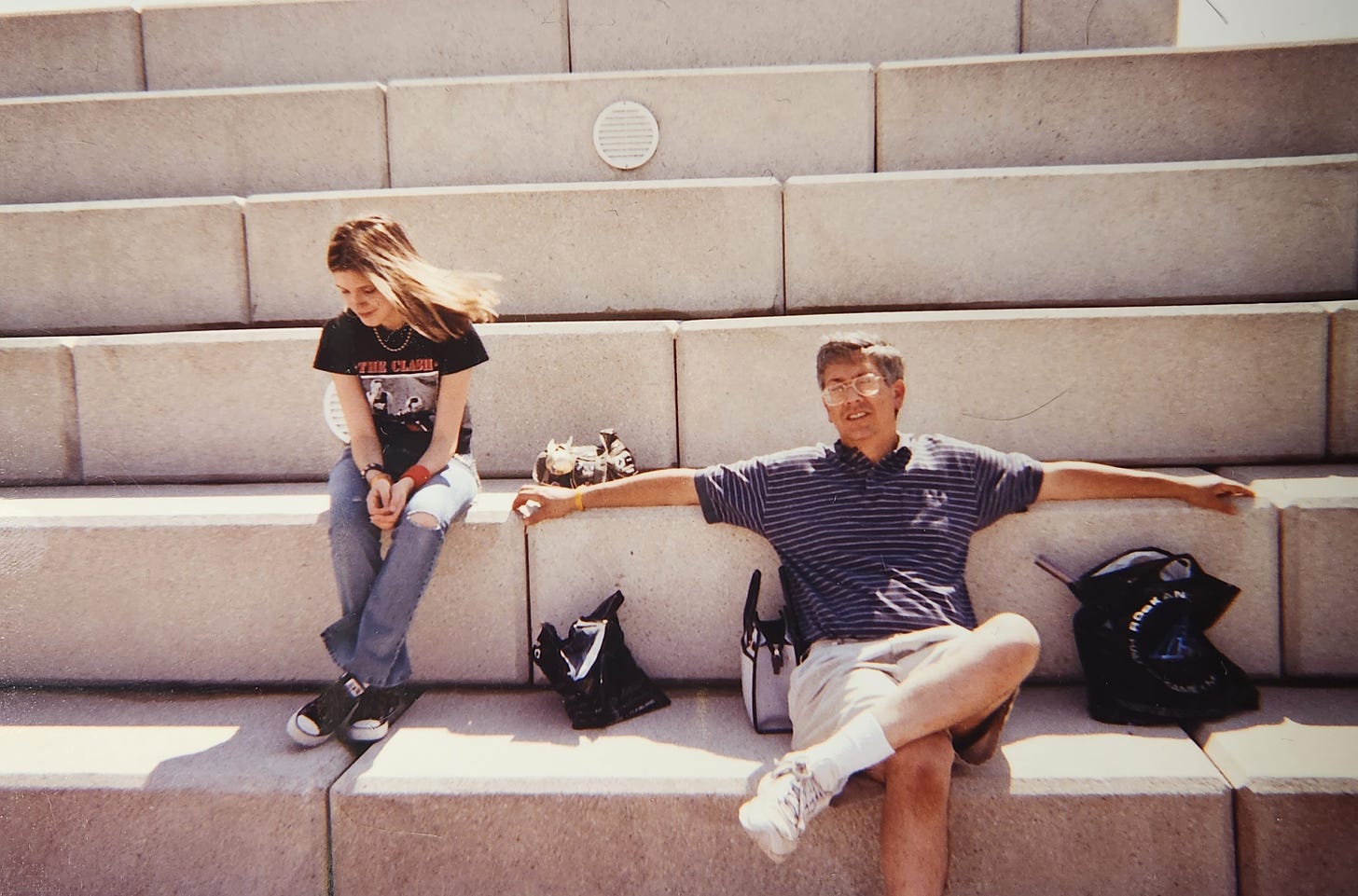Despite my increasingly creative (i.e., desperate) attempts to avoid the inevitable, I always seem to spend the Christmas season in a state of perpetual, low-lying dread.
It's that time of year when I'm expected to assemble the sharp, mismatched parts of myself into a coherent whole. When I'm supposed to condense the past year of my life into a tidy, family-friendly elevator pitch, ready to cheerily and expeditiously recite to anyone who asks. When I still feel immense pressure to perform womanhood—a role I've always been ill-suited for and that, in recent years, I've decided to abandon altogether.
I'm forever caught between my desire for authenticity and my compulsive tendency to make everyone around me more comfortable, and the Christmas season surfaces that tension in spades. I feel like it's my job—my festive duty, even—to be thoroughly unobtrusive. To be seen as the person I truly am during the holidays means I've fundamentally failed in my role as pleasant-looking-yet-thoroughly-inconspicuous set dressing. My job at Christmastime is to be, above all else, convenient.
So it makes sense that Christmas also brings up a lot of memories of my dad, one of the only people in my life around whom I never felt the need to contort myself into a more agreeable shape, around whom I always felt safe to be exactly who I was.
My Dad
Like a lot of boomer men, my dad described himself as conservative. But unlike a lot of boomer men, his conservatism always felt incidental—a thing that existed more in theory than in practice. I say that not to make excuses for him, but to illustrate that the political beliefs he expressed were, at least through my eyes, completely at odds with the way he lived his life.
An engineer, a handyman, and a lifelong tinkerer, he briefly harbored some hope that I might follow in his footsteps and become an engineer myself. But when it became clear that my strengths were in the arts, he offered nothing but enthusiastic and unwavering support. When I was in elementary school, he encouraged me draw on every inch of the massive whiteboard in his office and left my creations untouched for weeks (for his coworkers to admire, he claimed). When I was in high school, he was at every single one of my plays on opening night with a bouquet of fresh flowers in hand. When his birthday rolled around each year, even though I’d roll my eyes, he’d always ask that I write him a story.
I was in the room when died on August 1, 2010. Pallid, gaunt, and comatose after a two-year struggle with brain cancer, I remember worrying that this would be how I'd always remember him. In that respect, fortunately, time has been kind.
When I remember my dad now, 12 years after his death, I remember our shared insomnia when we stayed at my grandparents' house over the holidays. I remember creeping downstairs to watch TV only to find him already camped out on the couch, a warm and steady presence, Mars Attacks! playing quietly on cable. He made room for me to curl into his side, and we sat together in the darkened living room, multi-colored Christmas lights reflecting off the window.
My dad's red-voting, Rush Limbaugh-listening self coexisted with a gentle, nurturing man interested in science and gardening and genre fiction. He was endlessly patient, quick to laugh off tensions that other men would have escalated, and the first to help a neighbor who needed it. I never heard him raise his voice. He liked cooking chili, growing roses, and playing classical guitar. He thought The Beatles were the greatest band of all time, he was delighted when Return of the King won the Oscar for Best Picture in 2004, and his favorite book was Charles Dickens's A Christmas Carol.
A Christmas Carol
The thing about A Christmas Carol that I think a lot of people don't get is that it's funny. No one's being cute or ironic when they insist that A Muppet Christmas Carol is the best and most faithful adaptation. The laugh-out-loud bits are, more often than not, lifted directly from the original text. Of all the adaptions, it best captures Dickens's willingness to pair humor with deep introspection.
In the beginning of the story, Scrooge is a farcical figure, downright cartoonish in his misanthropy. On Christmas Eve, when two gentlemen call on him soliciting a donation for the poor and needy, Scrooge infamously rebukes, "Are there no prisons?"
Scrooge insisting that "[i]f [the poor] would rather die, they had better do it, and decrease the surplus population" is darkly funny, because the audience understands that the only way someone could say such a thing would be if they’d so thoroughly closed themselves off from human connection that they’d become detached from reality.
Scrooge has devil's-advocated himself into a life of misery and isolation, and he's just about the only person who can't see how wretched he's become. It's funny in the way that Ben Shapiro's hatred of John Lennon's "Imagine" is funny. He's so obstinately shut himself off from beauty that, when the music swells powerfully against the backdrop of his whiny indignation, it's hard not to feel just a little sorry for him.
When breaking off their engagement, Scrooge's ex-fiancée describes him as a man split in two. She still loves the man who proposed to her, she says, but she can't reconcile him with the man Scrooge has become, a man who has relinquished his soul to the single-minded pursuit of wealth.
"You fear the world too much," she answered, gently. "All your other hopes have merged into the hope of being beyond the chance of its sordid reproach. I have seen your nobler aspirations fall off one by one, until the master-passion, Gain, engrosses you."
Scrooge is so afraid of poverty that he's become obsessive in his avoidance of it; his once reasonable fear has morphed into all-encompassing greed. And that greed—insurance that he'll never need to rely on anyone else—further enables his isolation.
When he's visited by the Ghosts, Scrooge doesn’t undergo a massive and complete change of character overnight. The compassion and generosity unearthed in him were always there, entombed by his own self-indoctrination, weighed down by chains of his own forging.
When the ghost of Jacob Marley, Scrooge's former business partner (and portend of his own would-be doom), appears in his bedroom, Scrooge observes:
“You are fettered," said Scrooge, trembling. "Tell me why?"
"I wear the chain I forged in life," replied the Ghost. "I made it link by link, and yard by yard; I girded it on of my own free will, and of my own free will I wore it.”
Dropping the chains
When Scrooge first encounters Tiny Tim at the Cratchits' Christmas dinner, he's finally forced to reconcile his beliefs with reality. It's one thing to condemn nameless, faceless people to death, but quite another to be confronted with the flesh-and-blood humanity that death would squash out.
When Scrooge asks concernedly if Tiny Tim will die, the Ghost of Christmas Present throws his own words back in his face.
"If these shadows remain unaltered by the Future, none other of my race," returned the Ghost, "will find him here. What then? If he be like to die, he had better do it, and decrease the surplus population."
The Ghost of Christmas Present gets the last word, of course, because Tiny Tim's humanity does not need to be reasoned or argued for—Scrooge recognizes it intrinsically. He only needs to take one look at Tim and his callous, high-minded ideals vanish like a boogeyman exposed to daylight.
The disconnect between Scrooge's beliefs and reality was enabled by Scrooge cutting himself off from community. When that connection is tenuously reestablished, Scrooge realizes for the first time that the isolation he built for himself is not freedom from poverty, but a burden that's been steadily and relentlessly weighing him down. Now that he understands that, he only needs to drop the chains.
If My Dad Had Lived
Sometimes I wonder what would've happened to my dad if he'd survived into the Trump era. I think about the countless friends and acquaintances and internet strangers whose boomer dads fell down a far-right rabbit hole, brainwashing themselves with a cocktail of Fox News, Facebook memes, and their own gnawing dissatisfaction.
I think a lot of these men were vulnerable to Trumpism because they used their children as social crutches, and once those children grew up, they no longer knew how to take up space in the world. Instead of embracing vulnerability and forging their own connections, they became detached, angry, and disconnected without fully realizing when or why or how much. It's hard to feel the full weight of your fetters when you're accumulating them slowly, link by link.
I wonder if my dad would have fallen down this hole. I wonder if he would have shut himself off from his community in order to better blame them for his own misery. I wonder if he would have shut himself off from me.
Sometimes I think: Maybe. Probably. Yeah, he would’ve.
But then I remember the man who taught me that I don't need to be smooth-edged, agreeable, and convenient to deserve love. I remember the man whose favorite book was A Christmas Carol.
“But I am sure I have always thought of Christmas time... as a good time; a kind, forgiving, charitable, pleasant time; the only time I know of, in the long calendar of the year, when men and women seem by one consent to open their shut-up hearts freely, and to think of people below them as if they really were fellow-passengers to the grave, and not another race of creatures bound on other journeys.”






this is so beautiful. thank you for sharing with us <3
I really enjoyed this - so thoughtful and nuanced. The love and quiet understanding shines through.